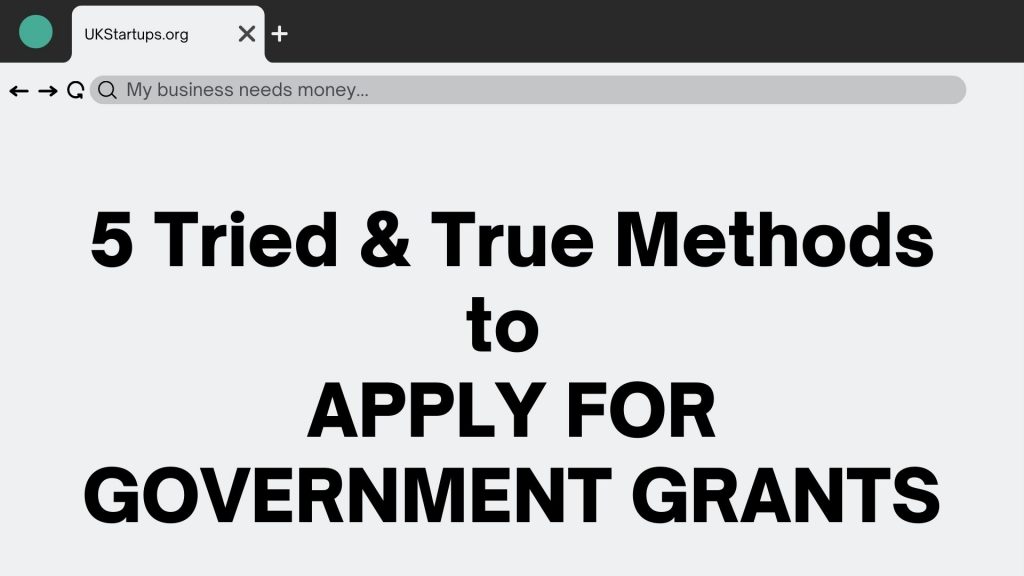5 tried and true methods to apply for government grants
Category: Funding & Financing
Tags: Apply for Government Grants, government grants, Grants
One sure way to help your small business in the UK is to apply for and receive government grants.
Most government grants in the UK are not a loan and can be used to grow your business without ever having to worry about making a repayment.
Government grants are a stroke of luck for entrepreneurs because they can be used to cover a wide range of costs associated with setting up shop or growing an existing business.
Government grants in the UK
You can choose from a number of different government grant options across the UK, which are outlined below.
All three levels of British government are involved in providing these funding opportunities.
Keep in mind that while most government grant programmes are considered non-repayable, there are also different types of grants.
As was previously mentioned, there are grant options that do not necessitate repayment, such as the government’s non-repayable grants. As long as the funds are used for the approved purposes, you are free to keep the money.
Government grants, both one-time and recurring, are another option that does not require repayment. One-time grants are available to help cover one-time costs like equipment upgrades or building renovations, while renewable grants can be used multiple times and applicants can keep coming back for more money. These revolving government grants are used for things like salary, benefits, training, and more.
Finally, a partial contribution grant is the third most sought-after type of government grant.
While this type of financing is common and not expected to be repaid, the business owner must provide the “other half” of the funds necessary to qualify.
For a partial contribution, the matching amount (in pounds or a percentage) can be anywhere from 20% of the total cost to 80% of the total funds.
To see all available government grant types in the UK and to access all available funding options, using the Funding Database will be of great help.
5 ways to get government grants in the UK
Finding out what kinds of government grants are offered is one thing. One more thing to do is search for suitable grants and alternatives.
This 5-step guide will increase your chances of successfully applying for and receiving the government grants your small business requires.
If you want to succeed, here are the 5 steps you need to take.
Step 1: Have your business plan ready to go
One of the most important things you can do to get government grants in the UK is to have a business plan.
A well-thought-out business plan will serve as a safety net, covering such essentials as the company’s model, its prospects for expansion, and its financial outlook.
A business plan is typically required and used as a basis for a decision regarding funding from most British government grant agencies.
A professionally written business plan can cost upwards of £2,500, but it’s important to keep in mind that the investment is well worth it.
You can also use the Business Plan Builder Tool available via UKStartups platform to get your plan done, following the standards that UK government grant agencies want to see. This is part of your membership with UKStartups.
Always seek out professional advice when crafting a business plan.
Step 2: Prepare your financial statements to look favorable
Both your financial statements and business plan are critical to the success or failure of your funding applications.
If you are just getting your company off the ground, you will likely only have projections for your finances. These projections are merely educated guesses about the future of your company.
It’s best practise to base your sales and expense projections on the more optimistic end of the possible range of outcomes. The key, though, is to act as though you already have the grant or funding you need from the government.
With this in mind, you can tell the applying agency, “this is what I assume is possible if you give me the financial support I need,” and present your financial projections accordingly.
Given that your company already exists, it is likely that you have a trading history and, hence, financial statements.
A three-year financial statement, including a balance sheet, cash flow statement, and profit-and-loss statement, is recommended.
Requesting assistance from a knowledgeable person is never a bad idea. But remember that you won’t get any UK government grants if your finances aren’t in order.
Step 3: Break down your funding needs to the specifics you need
The sole takeaway from finishing your business plan and putting together your financial statements is knowing where you stand in terms of funding.
This means that the various government grants available can be used to help with the costs you’ve identified as potentially being difficult to cover on your own.
In order to get the funding you need, it’s a good idea to break down exactly what it is you’ll need the money for. If you can show an allocation of how much is needed for each, you’ll have a better chance of getting the funding you need.
Know that a breakdown can help you find over 1,000 different grants, government loans, and tax options currently available via the UK government, including non-repayable government grants, one-time and renewable grants, partial contributions, and more. All can be found in the Funding Database.
Step 4: Do your funding search on a “broad level”
Finally, when you have your plan, your financial statements, and an idea of how much money you need, you can settle down and begin your search for funding.
When searching for government grants in the UK, it’s best to be as general as possible rather than as specific as possible, unlike when writing your business plan and financial statements.
Keep an eye on national options as well, as this is where the bulk of grant money is awarded. Don’t limit your search to just your immediate area; different regions provide funding for small businesses in different ways.
Pay close attention to the language used by the government. There is no money to replace storefront windows, but “renovations” or “leasehold improvements” may qualify for grants and funding.
Wage subsidy or wage support may be available to cover all or part of the cost of paying your marketing manager.
While there are no funds to buy laptops, you may be able to get “equipment purchase” funds.
It will help you immensely with the potential government grants if you are well-rounded and knowledgeable about what is available in terms of funding and how to best search it.
Step 5: Review the grant application requirements
After you have narrowed down your choices, it’s time to apply for grants.
The majority of unsuccessful grant applicants usually make one or two easy mistakes.
Before submitting an application for a grant, take a deep breath, read the instructions carefully, and make a list of everything you’ll need to submit.
Read the application requirements carefully to ensure your success. Common examples include a business plan, financial statements, PitchDeck, and possibly a cover letter.
The agency may have requirements for the application’s format, the documents you must include, and the dates you can submit your request for consideration. The difference between being accepted and rejected for a grant lies in whether or not you meet these requirements.
The aforementioned are the five most reliable methods for obtaining government grants in the UK. Adhere to them; if you’re unsure how to proceed, seek advice.





